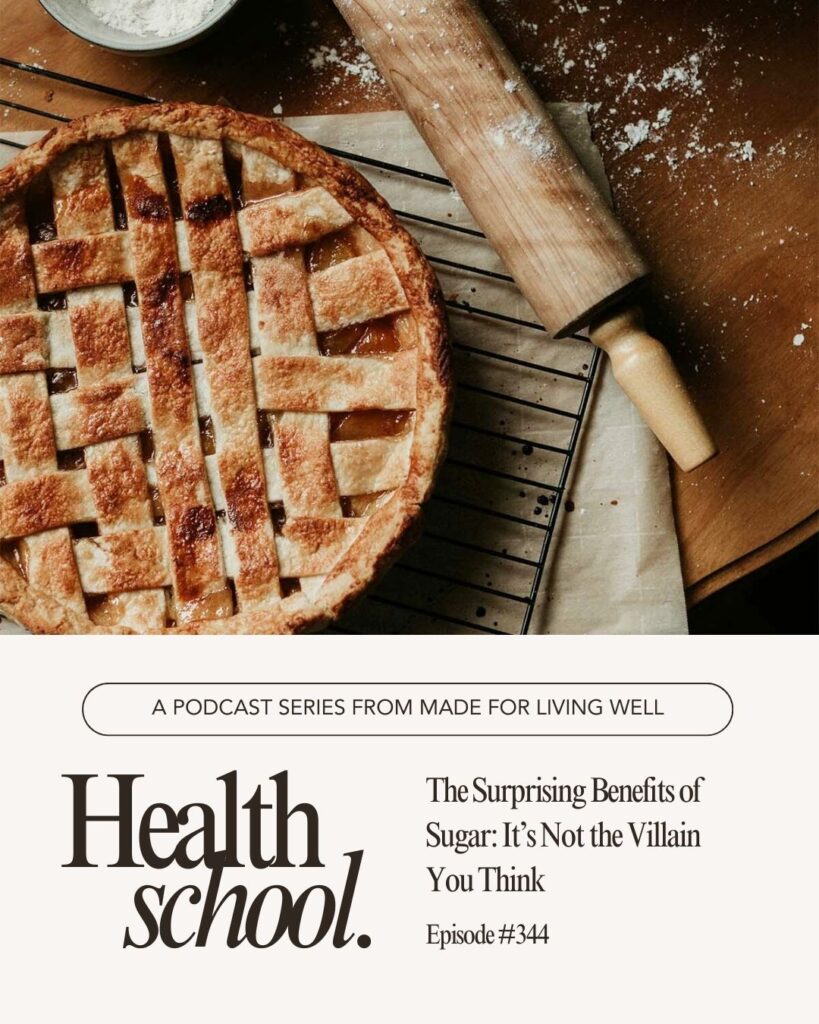
Listen on iTunes | Listen on Spotify | Listen on YouTube | Review the Podcast
Food has a lot of power in the health space. It might even be the reigning king, but sometimes, it’s distracting you from more important issues. Take sugar, for instance. It’s not the villain in the story. In fact, there are many benefits of sugar (some may surprise you).
Spoiler to tip one: Your body needs sugar.
Unfortunately, our use of processed and modified sugars has led many people to overconsume them, creating a cascade of health problems associated with sugar. But to clarify, those problems exist not because you consumed sugar but because it causes instability or a rise in your blood glucose levels that are outside your homeostatic balance.
I think it’s important to clarify the problem – that sugar is not the problem but the instability or spikes in your blood glucose – when you understand this, you can focus more on blood glucose regulation and less on restriction.
Food and our fascination with restriction and deprivation of specific food groups has been the highlight of health. Unfortunately, it’s not as powerful as we’ve made it. Food alone certainly isn’t going to be what changes you.
If food were the answer, we wouldn’t be having this conversation. We’d be living in a thin and healthy world. But we’re not. Partially because we’ve gotten so lost in food thoughts that we miss the larger picture. But it’s also because the process of sugar elimination denies your physiological needs, including the need for sugar.
Sugar is so important that your body can make it when you don’t consume it. This is called gluconeogenesis.
Inside this podcast, I teach you the benefits of sugar, including why you need it, what happens when you eliminate it, the addiction behind it, and the real problem (that is less about sugar and more about stress).
Stop blaming sugar. It’s not your problem.
I feel the need to stand up for sugar. To answer the common questions, such as, “Is sugar really bad for health?” And “Am I addicted to sugar.” Or “How do I overcome sugar cravings.” But mostly, I want to persuade you to see a new approach that highlights the real issues inside your biology. To help you understand, sugar isn’t the villain in health, but there are many benefits of sugar.
Of course, an overconsumption of sugar (like all things) or consuming the wrong forms creates problems. Anything consumed outside balance—in excess or restriction—can cause problems.
I don’t want you to hear me say consume excess sugar. Instead, I hope to teach you to stop blaming food and start recognizing that the real issues happen within us—our lack of choice. We all have a choice in what we consume. Unfortunately, it can often feel out of our control partially because our physiological response is greater than our mind response. But this only happens when we fail to provide what our body needs.
Again, biologically, we need some level of sugar to thrive. Sugar serves a physiological role. You actually have a biological need for glucose.
Here are five uncommon Benefits of sugar – the truth we often overlook.
01. Certain Cells Rely on Sugar To Function Well
Society is quick to make rash claims, villainizing substances that really aren’t the problem. Of course, the overconsumption of sugar can create problems, but so can the underconsumption. That’s because sugar serves a purpose in the body. Your cells rely on sugar to help generate energy. Your brain, eyes, kidneys, and red blood cells rely solely on glucose as a nutrient for fuel.
Glucose is so important that your body has a continuous flow of it. This tightly regulated process lowers blood glucose when elevated and increases it when it plummets to maintain the homeostatic level.
Even in ketogenesis (the absence of food sugar), your body still circulates glucose. Without food sugar, your body can (and will) break down other food sources or your own tissue to produce sugar. It’s vital to survival and thus required in health.
Sugar in itself is not the problem. Problems exist when you fall outside your homeostatic balance (consuming too much or not enough) for prolonged periods, creating excess stress that leads to metabolic dysfunction.
02. You will produce glucose even if you don’t consume it.
This point brings up one of the most powerful understandings in the sugar conversation. Your body can produce sugar, regardless of if you consume it. This is known as gluconeogenesis. It converts non-carbohydrate substances like fat, protein, and other substances (and cells) into glucose.
The most common stimulant for gluconeogenesis is a cortisol response—it’s stress! That’s why you can gain weight by looking at food, even when you don’t eat it. Your perception of life changes your nervous system response, dictating your cortisol response. An elevation in cortisol leads to the production of glucose via gluconeogenesis.
Of course, it’s easy to villainize this process and blame sugar, but it happens based on survival. Your body does it to help protect you and keep you alive. I’d argue that instead of villainizing sugar, you need to have some serious conversations about how to handle stress, not to get rid of it but to learn how to regulate your response to it.
Sugar is a surface-level issue, it can cause problems, but there are also benefits to sugar. The deep root always comes back to stress.
03. Your cortisol response matters more than your insulin response.
Cortisol and insulin are both critical hormones that have opposing effects on blood sugar levels, but cortisol can be more powerful than insulin when cortisol levels are chronically elevated.
Cortisol changes what your body does with glucose more negatively than insulin. Of course, I think both are good and necessary but within balance.
Interestingly, the process of insulin resistance is arguably helping to protect you. Research studies have found that insulin resistance can occur when underfeeding glucose by increasing insulin resistance in many non-life-saving cells while decreasing it during survival processes. That means it slows the ability of specific cells to take in glucose so that glucose can be reserved for your survival functions, such as brain health and red blood cell production.
It has also been shown that insulin resistance decreases glucose intake into cells to prevent further adipose storage (to help stop weight gain). It’s wild, right?
Likewise, insulin can still cause issues. However, cortisol tends to be more potent than insulin in dictating how glucose is used or stored.
This makes the stress response more powerful than the food you consume.
04. Sugar acts on your reward centers (helps you feel pleasure).
I’ve long believed that restriction creates more desire, not less. When you deprive yourself of something, you generally build more obsession for it. This is especially true of anything that acts on your reward centers.
Surprisingly, your reward centers have a lot of power over your health. I like to think of them as a ‘sense’ that signals to your body, determining how safe or unsafe it is. When you activate your reward centers, your body relaxes. It turns on a neurological and hormonal cascade that makes you feel good.
It might seem selfish, but it’s necessary for survival and thriving. You need to ignite your pleasure centers daily. Unfortunately, our restriction and bingeing-based society make it difficult to find a healthy level of pleasure. Instead, we’re getting high highs and low lows, leading to a dysregulation in your pleasure centers, creating a lack of safety. In the end, this leads you to the cycle of cravings, bingeing, and guilt.
However, understanding the need for pleasure, including food pleasure, helps you create better control of your health because it regulates your nervous system.
If you haven’t already, please listen to the podcast on the art of pleasure. It’s fascinating.
05. Consuming it will help you need less of it (slow sugar cravings).
It seems backward, but most good things I’ve found are. When you consume sugar, you’ll need less of it.
This works against the general idea that consuming too much will lead to an addiction to it. But your need comes from something other than consuming too much sugar. It comes from not producing enough energy.
The most essential function of health (specifically metabolic health) is the ability to generate energy. The more energy you generate, the more energy you have to heal and thrive.
To generate energy, your cells require nutrients or metabolites. These are the building blocks or ingredients required to produce cellular energy. Without these, your energy levels decline, and your body begins to hoard, store, and conserve any energy (or energy metabolites, like body fat) it can.
Carbohydrates are metabolites for energy production. Providing these essential building blocks helps you generate energy. When you generate energy, you need to consume less of it.
Unfortunately, many people live in energy debt, underproducing energy and forcing them to rely on their survival response. While possible, it’s not healthy or beneficial, often leading to the overconsumption of unhealthy food choices that only perpetuate the cycle of lacking energy.
Do you know how much biological energy you have?
Take the quiz to learn your energy level and how to fix it.
The goal is to eat enough of the right types of sugar, supplying the body with the necessary building blocks to generate energy. That means consuming more high-quality carbohydrate (sugar) sources.
The closer it is to nature, the healthier it will be. Focus on consuming more starchy vegetables, fruits, honey, and maple syrup. Adding an appropriate amount will decrease your need and drive for unhealthy carbohydrates or energy-void carbohydrates or sugars like candy, pop, and processed foods.
But getting there is a process. If you’ve been undereating carbohydrates, take it slow. Your body must learn to process and handle them again, which doesn’t happen in a day. Add or decrease your consumption slowly, let your body adjust, and be aware of how your desires and cravings change in the process.
By all means, stop letting health be another stress in your life.
If health is stressful, it’s doing more harm than good. Remember, the greatest negative effect on blood glucose is the stress response. Stop villainizing food and start to see its value.
Want to learn more about health (and the benefits of sugar)?
Check out the previous anti-dieting podcasts in the mini-series that highlight reducing stress. Part one dives into the biological need for dieting, part two is on the generational curse of health, and part three is about the power of forgiveness.
You might also find these resources helpful as you change your view of sugar (and food and health) and start to be a creator of it. If you were surprised to learn the benefits of sugar, you will love these additional resources.
- Health Made Simple: The home to changing the narrative and story about health so you can finally start to live it.
- We Tried Continuous Glucose Monitoring (Levels) for 30 Days, This Is What We Learned.
- My Results From Continuous Glucose Monitoring for 30 Days
- Learn from Dr. Casey Means: Lower Blood Glucose Levels With These Doctor-Backed Tips
- 12 Ways to Make Health Simple
